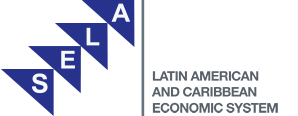BACKGROUND
Within the framework of the XXXIX Regular Meeting of the Latin American Council, held in November 2013, the Embassy of the Republic of Ecuador requested the Latin American and Caribbean Economic System (SELA) to prepare a study on “Public spending and procurement systems in Latin American and Caribbean countries” with a view to evaluating the economic and social effects of such procurement, as well as “its role in development models in the region’s countries as a tool for promotion of certain productive sectors and as an instrument for incorporation of value added and local innovation.” The study should also assess the “situation of the various national public procurement systems in Latin American and Caribbean countries, in order to identify achievements and shortcomings in terms of modern, efficient, expeditious, reliable and auditable recruitment systems.”
In compliance with Activity I.2.4 of the Work Programme for the year 2014, the Permanent Secretariat of SELA prepared the document “Public procurement as a tool for development in Latin America and the Caribbean” (SP/Di No. 11-14).
According to this study, the different national experiences in the region have shown some regulatory and administrative progress in core principles of public procurement, such as the following: efficiency and transparency in the use of public resources, advertising of offers and inclusion of potential suppliers. The various reforms in laws and procedures related to public procurement in several Latin American and Caribbean countries – particularly extensive in the last decade – have prompted a series of changes, such as the incorporation of small and medium-sized enterprises (SMEs) as the main supplier of the State, the adoption of environmental standards and the use of new technological tools in acquisition of goods and services.
In addition, the study highlights the important role of public procurement in the economic performance of nations. In fact, public spending promotes aggregate demand and employment, boosting local production. In addition, public procurement can be used as a tool to stimulate and leverage sectors and activities of the utmost importance for national development, such as activities that use technological resources. As a result, the design and implementation of modern, efficient, transparent and properly targeted public procurement systems must be taken into account on the development agenda of Latin American and Caribbean countries.
Taking as a reference the aforementioned study, the delegation of Ecuador, attending the XL Regular Meeting of the Latin American Council, held in November 2014, requested SELA to include in its Work Programme for the year 2015 a follow-up meeting to assess progress of the study SP/Di No. 11-14, which was incorporated into Activity II.1.4 “Public procurement systems in Latin America and the Caribbean.”
For its part, the Plan of Action of the Community of Latin American and Caribbean States (CELAC) for 2014 includes, in the “Finance” section, the following paragraph: “The Working Group on Finance will convey to the areas of the CELAC member States responsible for and/or involved in public procurement, the importance of analyzing the different existing systems and potential cooperation mechanisms in this field in the countries of the region.”










